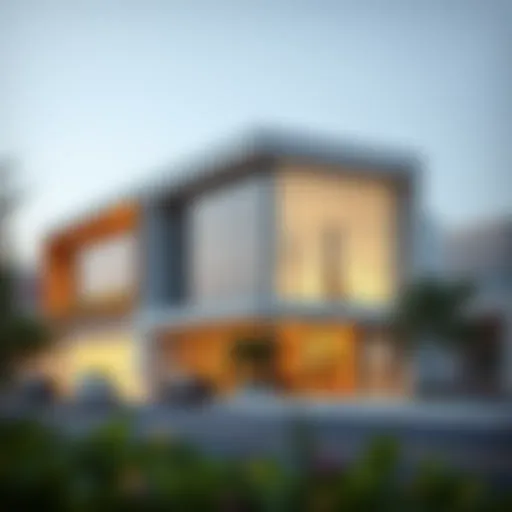Exploring the Eid Holiday Impact in Dubai
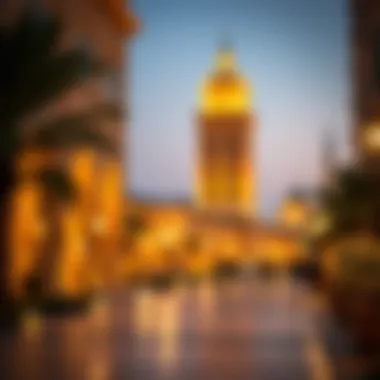

Intro
The Eid holidays in Dubai hold a unique place in the cultural tapestry of this dynamic city. As the sun sets on Ramadan, the moment ushers in a festive air that’s palpable throughout the streets. Families gather, children play, and communities unite in celebration. Beyond the joyous merriment, there are layers of significance attached to these days that stretch from the spiritual to the economic.
The Significance of Eid
Eid al-Fitr, marking the end of Ramadan, symbolizes gratitude and reflection. In Dubai, it’s not just a holiday; it serves as a mirror reflecting the intricate social fabric of its inhabitants. The multifaceted nature of this observance encapsulates everything from traditional family meals to lavish public festivities, displaying the city's rich Arab heritage alongside its modern cosmopolitan vibes.
Community and Togetherness
During these holidays, the essence of community shines through. Neighbors come together, and relatives gather, bridging gaps that may have formed throughout the year. This unity fosters deeper relationships and improves social cohesion. Moreover, this spirit of togetherness is evident in the bustling markets, community events, and charitable initiatives that flourish during Eid.
Economic Impacts
As the festivities unfold, the economic implications cannot be brushed aside. Eid is a time when consumer spending spikes significantly. From fashion to food, businesses often see a noticeable boost. The exhilarating atmosphere draws tourists, enhancing the city’s status as a global destination.
In this article, we will unravel the various dimensions of the Eid holiday, emphasizing its relevance in Dubai's market trends, social gatherings, and community life. Readers interested in the intersections of culture, economy, and real estate market dynamics will find valuable insights as we explore the multifaceted landscape of Eid.
Eid Celebrations: An Overview
Eid celebrations represent a vibrant aspect of life in Dubai, weaving together cultural traditions, social connections, and economic activities. They signify more than just a religious observance; they embody the spirit of unity and generosity that permeates the Emirati culture. In this section, we will explore the key layers of Eid, dissecting its historical foundations and cultural significance.
Historical Context of Eid
Eid, particularly Eid al-Fitr and Eid al-Adha, has roots that reach deep into the Islamic faith, marking important milestones in the Islamic calendar. Eid al-Fitr, celebrated after Ramadan, is a jubilant expression of gratitude for the strength shown during the month of fasting. Eid al-Adha, conversely, commemorates the willingness of Ibrahim to sacrifice his son as an act of obedience to God, representing selflessness and devotion. The celebration of these Eids has morphed over the centuries, intermingling with regional customs and practices.
In Dubai, the historical context of Eid intertwines with the cosmopolitan nature of the city. As Dubai evolved from a small fishing village to a global hub, the ways in which Eid is celebrated have also transformed, accommodating a blend of local traditions and international influences. The essence of Eid remains intact, yet each year it evolves further, reflecting the dynamic and diverse population that calls Dubai home.
Cultural Significance of Eid in Dubai
Eid in Dubai is not merely a day off from work; it is a time of reflection, celebration, and togetherness. Local families often dress in traditional attire, symbolizing pride in their heritage while also welcoming multicultural practices that have woven into the fabric of the holiday. The five daily prayers, special Eid prayers conducted in congregation, and the giving of zakat (charity) are integral components of the observance.
This celebration extends beyond the family unit. The community plays a crucial role, evidencing a culture that thrives on connections and collective festivities. Streets are adorned with lights, and public spaces such as parks and malls host events that draw in large crowds. From cultural parades to intricate pop-up markets, the energy and excitement are palpable.
There's also a strong emphasis on hospitality during Eid. It’s common for families to invite friends and neighbors over for lavish meals, showcasing dishes that might include traditional lamb dishes or a melange of sweets, each crafted with care to honor the festive spirit. The cultural context reflects a deeper commitment to unity and compassion, traits that resonate with every individual in the community.
"During Eid in Dubai, the spirit of giving permeates every corner, turning the city into a tapestry of warmth and generosity."
To encapsulate, Eid celebrations in Dubai serve as a powerful reminder of the intertwined histories and cultures within the city. They promote a distinctive identity while simultaneously embracing the diverse influences brought by residents from all over the world. As we further explore the public celebrations and events surrounding Eid, it's crucial to recognize the unifying force it represents in a city so rich in tradition and diversity.
Public Celebrations and Events
Public celebrations during Eid in Dubai transform the city into a spectacular showcase of culture, tradition, and joy. These events are not just vital for the local community, but they also serve a broader purpose, bridging cultural divides and showcasing the best of Emirati hospitality to the world. They create an atmosphere where residents and visitors can come together, fostering unity and shared experiences.
Major Festivals and Activities
Eid in Dubai is marked by a variety of festivals that are both iconic and unique. One of the largest events is the Eid Al Fitr Festival, where families gather to partake in prayer services at grand mosques such as the Grand Mosque in Dubai. The city also lights up with fireworks, particularly noticeable at the iconic Burj Khalifa, attracting thousands of spectators.
Key activities include:
- Carpet Bazaar: Local artisans display beautifully woven carpets, an activity that not only promotes the art but also supports small businesses in the region.
- Eid Carnival: Hosted in various parks, this event features games, rides, and cultural performances, making it a favorite among families.
- Shopping Festivals: Unique offers and discounts in malls such as Dubai Mall and Mall of the Emirates boost retail engagement, enhancing consumer spending during the holiday season.
This confluence of activities elevates Dubai's status as a travel destination, encouraging both local and international tourism. The vibrancy of these events invites visitors to immerse themselves in the heart of Emirati culture, providing an experience filled with excitement and festivity.
Community Gatherings and Traditions
Community gatherings during Eid are the heartbeat of the festival, where friendships rekindle and families unite. From traditional Eid prayers in sprawling parks to communal feasts, these gatherings highlight the importance of togetherness in Emirati culture. The practices surrounding these events reflect deep-seated values of hospitality and solidarity.
Residents often prepare maamoul (a type of date-filled pastry) and distribute it to neighbors, solidifying bonds and welcoming newcomers. Additionally, many locals visit relatives, ensuring the elderly and less fortunate are included in the celebrations.
It's also crucial to acknowledge how public events serve as educational moments for tourists and expatriates, giving them insight into the customs and traditions of the Emirati people. Sharing meals, exchanging gifts, and participating in local games promotes a sense of belonging and respect between communities.
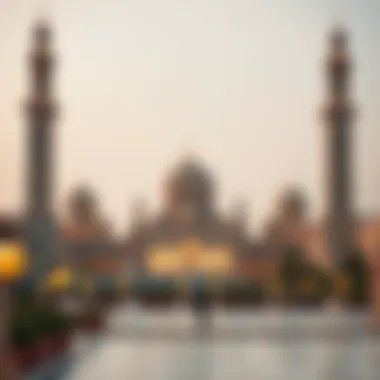

In summary, public celebrations and events during Eid in Dubai encapsulate a unique blend of cultural heritage and modernity. They reflect the values of the community, enhance tourism, and foster connections that extend beyond borders.
"Eid’s public festivities confirm the spirit of unity, highlighting Dubai’s role not just as a city but as a melting pot of cultures.”
For further insights into Emirati traditions during Eid, refer to resources from Britannica or Wikipedia.
Links for additional information on Dubai's tourism events can be viewed on Visit Dubai.
Eid's Impact on Tourism
Eid, a significant festivity in the Islamic calendar, has profound implications for tourism in Dubai. Each year, as the holiday approaches, a palpable excitement fills the air and city streets. Tourists flock to the Emirate, drawn not just by the holiday itself, but by the various cultural offerings and festive activities that unfold during this special time. The significance of Eid extends beyond the joy of celebration; it intertwines with Dubai's economic fabric, affecting hospitality, retail, and the overall tourist experience.
Tourist Influx During Eid
Every Eid, Dubai experiences a surge of tourists eager to immerse themselves in the local culture. This influx can be attributed to several factors, including favorable weather and the unique experiences the holiday provides. The months preceding Eid are marked by extensive marketing campaigns, both from the government and local businesses, hoping to attract visitors.
- Increased Travel Options: Airlines often expand their services in anticipation of this high-demand season. More flights and better deals can be found, enticing international travelers.
- Family Gatherings: Many expatriates living in Dubai invite relatives from abroad to share in the celebrations. This net effect results in a wider pool of visitors.
- Cultural Appeal: The festivals, vibrant markets, and communal prayers evoke interest from those outside the region, eager to understand local traditions.
The impact is visible. Hotels witness high occupancy rates, and restaurants bustling with patrons as families and friends gather to break fast and partake in festive meals. Local attractions and entertainment venues, equipped to cater to large crowds, often extend their hours or introduce special Eid-themed events.
Attractions and Activities for Visitors
As the Eid season dawns, Dubai transforms into a mosaic of cultural experiences, appealing to a broad spectrum of tourists. Visitors can explore traditional and modern attractions alike, which enrich their understanding of Emirati heritage and contemporary offerings.
- Cultural Events: Various cultural festivals are organized, showcasing traditional music, dance, and art. Events like the Dubai Shopping Festival, which happens to coincide with Eid, offer an array of activities and discounts.
- Family-Friendly Activities: Parks and landscaped areas boast festive decorations, host fun fairs, or set up pop-up markets. Families can enjoy activities such as face painting, crafts, and more, ensuring that children are entertained as well.
- Dining Experiences: Many upscale restaurants create unique Eid menus, fusing traditional dishes with innovative culinary twists. Dining becomes an event in itself, with folks looking to share memorable meals.
- Fireworks Displays: One of the highlights of Eid celebrations is the spectacular fireworks shows. These grand spectacles are often synchronized to music and attract large crowds, creating a festive atmosphere.
The Eid celebrations not only pay homage to cultural traditions but also foster connections among diverse communities, enriching the social tapestry of Dubai.
Economic Implications of Eid
The economic implications of Eid celebrations in Dubai extend well beyond festive cheer; they present a unique tapestry of opportunities and challenges that resonate throughout the city’s economic landscape. The intertwining of culture and commerce during this holiday season creates a bustling environment that affects various sectors such as retail, hospitality, and even real estate. Understanding these implications is crucial for investors, agents, and anyone looking to tap into the vibrant energy that Eid brings to the emirate.
Retail and Consumer Spending
During Eid, consumer spending reaches a fever pitch. Shoppers flock to malls and markets, often taking part in a tradition known as Eid shopping, where families splurge on gifts, clothing, and food to celebrate the holiday. The surge in demand prompts retailers to roll out attractive promotions, leading to a significant boost in sales.
Statistics from Dubai’s Department of Economic Development highlight that retail spending during Eid can sometimes see an increase of over 30% compared to regular months, providing a pleasant windfall for businesses.
- Key Drivers of Consumer Spending:
- Cultural significance: Shopping is viewed not just as a transaction but as a way to celebrate and connect with traditions.
- Festive promotions: Many retailers offer discounts, making it an ideal time to purchase items that might have been out of reach or in luxury range previously.
- Increased tourist activity: With visitors flooding in for the festivities, local shops and restaurants often see increased foot traffic, contributing to a cycle of economic enrichment.
This uptick in spending doesn’t just benefit retail; it positively impacts logistics and shipping sectors as they scramble to ensure stock availability. Ultimately, the bustling market scene reflects a broader trend where Eid becomes a catalyst for economic growth in diverse ways.
Real Estate Market Trends
Eid’s influence extends into the real estate sector, propelling both short-term and long-term trends that shape market dynamics in Dubai. With the influx of tourists and expatriate families visiting for the holiday, there’s a marked demand for temporary housing solutions. This opens the door for short-term rentals, especially in popular districts near downtown and tourist attractions.
- Short-term Rentals:
- Hotel Expansions:
- Platforms like Airbnb gain traction, as travelers seek flexible accommodations. Owners often see a spike in rental prices during the Eid holidays, marking this period as potentially lucrative.
- This has led to many property owners investing in furnishing and optimizing their spaces to cater to a diverse clientele that values comfort and connectivity.
- Leading hotel chains ramp up their offerings to attract Eid celebrants, leading to an overall uptick in available rooms during this peak season. They often offer exclusive Eid packages that include celebratory meals and experiences, making it an attractive option for holidaymakers.
But the implications do not end with the holiday. The impact on property values can also be felt long after Eid has come and gone. Investors are often keen to analyze seasonal trends when considering property purchases as the high demand for rentals can lead to increased property prices within popular areas.
"Eid serves more than just a cultural role—it is an economic engine that fuels various sectors in Dubai, offering both immediate and lasting benefits."
Eid and the Real Estate Sector
The intersection of Eid celebrations and the real estate sector in Dubai offers a unique perspective on how cultural festivities can shape market dynamics. Each year, as the Eid holiday approaches, real estate agents and investors take a keen interest in understanding the implications of this festive period. The demand for housing, both temporary and permanent, sees fluctuations that can lead to noteworthy opportunities for those in the market.
Temporary Housing Solutions for Visitors
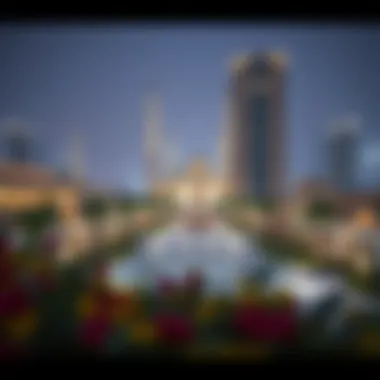

Short-term rentals
Short-term rentals have become a cornerstone of the hospitality landscape in Dubai, particularly during Eid. This segment caters to a significant influx of visitors who come to celebrate with family or seek an experience that immerses them in local traditions. These rentals—often found in prime locations—allow for flexibility and a more personalized stay compared to conventional hotels.
The appeal of short-term rentals lies in their key characteristic: they offer the comforts of home away from home, often providing a kitchen and ample space for families. This aspect can be especially beneficial for those traveling with children or groups.
However, it’s essential to be aware of the fluctuating regulations regarding such rentals. While they offer advantages in terms of convenience and affordability, potential renters should always check for legality and compliance with local laws within Dubai. Therefore, while short-term rentals provide unique advantages, they also carry the weight of regulatory considerations that can impact both visitors and landlords alike.
Hotel expansions
In response to rising tourist numbers during Eid, hotel expansions in Dubai have become increasingly prevalent. Major chains and boutique hotels alike have recognized the potential for enhanced revenue during this festive season. The expansion or renovation of existing hotels allows them to accommodate a greater number of guests and offer improved facilities, thereby enriching the overall visitor experience.
A fundamental characteristic of these expansions is their focus on luxury and cultural integration. Newer hotels often emphasize features that reflect the rich Emirati heritage, making them an appealing choice for tourists seeking authenticity. This not only boosts occupancy rates during Eid but also elevates the hotel’s reputation in the long run.
Nevertheless, there are challenges that come with such growth. Increased competition among hotels can lead to price wars, potentially diminishing profit margins. Additionally, the construction of new hotels may lead to temporary disruptions in local communities, which can affect reputation and customer experience. In summary, hotel expansions during Eid play a significant role in shaping the city's tourism landscape, providing benefits while also presenting specific challenges.
Long-term Effects on Property Values
Investment opportunities
The surge in demand for real estate linked to Eid celebrations has created numerous investment opportunities. Investors looking to tap into the hospitality and rental sectors during this period have the chance to see substantial returns. Properties that are strategically located near popular attractions see increased interest, particularly from international buyers eager to capitalize on the influx of tourists.
A distinctive feature of these investment opportunities is their seasonal nature; they allow investors to leverage the holiday’s influence on property values. Investors who make timely decisions may find themselves sitting on lucrative assets as property values rise in the lead-up to and following Eid. However, the market can be cyclical, warranting a careful approach to avoid pitfalls associated with speculative investments.
Market stability
The influence of Eid on market stability cannot be overstated. As demand spikes, property values often reflect a temporary increase, but this can also lead to nuances in long-term market stability. Investors must navigate these waters carefully, looking beyond the excitement of seasonal demand. Assessing long-term trends becomes paramount in ensuring that their investment holds value beyond the festive period.
A critical aspect of market stability is that it fosters confidence among buyers and sellers. When property values are steadily increasing due to consistent demand during holidays like Eid, it encourages ongoing investments and developments. Yet, one must also be cautious, as rapid fluctuations can lead to uncertainty in a highly dynamic market like Dubai. This balance is a crucial consideration for anyone involved in the real estate sector during Eid.
"Eid isn't just a holiday; it's a catalyst for growth in the Dubai real estate market. Understanding its implications is crucial for investors and stakeholders."
Cultural Etiquette During Eid
Eid is not just a holiday; it is a tapestry of traditions woven into the very fabric of society in Dubai. As such, understanding cultural etiquette durante Eid is paramount for fostering respect, harmony, and meaningful connections between visitors and locals. Observing proper etiquettes can enhance the experience during the celebrations and bridge cultural gaps.
Understanding Local Customs
In the context of Dubai, the local customs surrounding Eid reflect the deep-rooted Islamic values and the blending of various cultural influences:
- Greeting Rituals: When meeting someone during Eid, it is customary to say "Eid Mubarak", which translates to "blessed Eid". A friendly smile and a handshake are generally acceptable until physical contact is deemed inappropriate by cultural norms. This small greetes can open pathways to friendships.
- Dress Code: Modest attire is encouraged for both men and women. Traditional clothing like the kandura for men and the abaya for women are common. Aiming for a polished look showcases respect for the occasion and its attendees.
- Gift-Giving: Exchange of gifts, especially Eidia, is a gesture of goodwill. Typically, money is given to children, symbolizing blessings and prosperity. A token of appreciation, like sweets or dates, can be a delightful touch in expressing hospitality.
Participating in these customs not only aligns visitors with local traditions but also demonstrates appreciation for the cultural landscape of the city.
Do's and Don'ts for Visitors
Navigating through the social semantics of Eid can seem daunting, yet familiarizing oneself with the key do's and don’ts makes the journey much smoother:
Do's:
- Participate in Prayers: Attending prayer services at mosques or community areas can be a profound experience. A respectful demeanor and appropriate dress will help you blend in seamlessly.
- Enjoy Traditional Foods: Feeling adventurous? Trying out traditional dishes like biryani or kunafa during communal feasts is a must. These culinary treasures narrate stories of unity and celebration.
- Be Mindful of Time: Eid celebrations can sometimes stretch well into the night. Being patient and understanding of cultural timelines enhances interactions and minimizes frustrations.
Don'ts:
- Avoid Public Displays of Affection: While Dubai is modern, certain behaviors still need to be approached with caution. Expressions of affections should be reserved for private spaces.
- Don't Discuss Political or Religious Topics: These discussions can raise sensitivities. It’s best to keep conversations light and avoid diving into controversial territories.
- Refrain from Direct Criticism: Observations made about local customs should be expressed with caution. It's important to respect the beliefs and traditions observed by those around you.
Understanding and embracing the cultural etiquette during Eid can create a more enriching experience. Respect towards local traditions fosters goodwill and can lead to lasting connections.
In summary, grasping the local customs and following established do’s and don’ts allows visitors to partake actively in the spirit of Eid while promoting mutual respect between diverse cultures. For a deeper dive into cultural ethics in the UAE, you might explore resources like Wikipedia or Britannica.
Celebratory Cuisine and Gastronomy
The culinary landscape during Eid in Dubai plays a pivotal role in encapsulating the essence of the holiday. Food is not merely sustenance; it functions as a vessel for cultural exchange and familial bonding. Traditional meals served during Eid reflect a rich history, marrying flavors that resonate with the heritage of communities. It’s also a time when the act of breaking bread transcends nourishing the body to enter the realm of celebrating togetherness and gratitude.
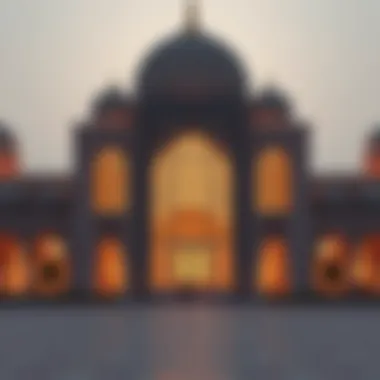

Traditional Dishes of Eid
Dubai's Eid festivities bring forth a treasure trove of traditional dishes, each with its unique significance. For instance, lamb biryani is a staple that ignites the senses, often infused with aromatic spices and served alongside tangy raita. Another cherished dish is mutton kebabs, known for their juicy tenderness and smoky flavor, which are grilled to perfection and served hot.
- Dates and Arabic Coffee: No meal is complete without the customary dates, often paired with rich Arabic coffee. This combination symbolizes hospitality and is a reminder of the traditions passed down through generations.
- Mahalabia: A sweet pudding made with milk and flavored with rose or orange blossom, often garnished with nuts, serves as both a delicious dessert and a nod to the holiday’s festive spirit.
During Eid, families gather not just around meals but also around the stories and memories that these dishes evoke. The kitchen transcends its role as a cooking space; it becomes a heartwarming environment alive with laughter and shared experiences.
Restaurant Offerings During the Holiday
Eid isn’t exclusively a home-based experience; eateries across Dubai put on quite the show during this festive season. A plethora of restaurants offer dedicated Eid menus that present traditional dishes alongside modern twists. Many establishments incorporate seasonal ingredients, ensuring that every bite is reflective of both the holiday and local culinary trends.
- Buffet Specials: Some fine dining restaurants, like Bice Mare and Zheng He’s, provide lavish buffet spreads, rolling out epicurean delights that invite guests to indulge in what Emirati cuisine has to offer.
- Themed Events: Various places also host themed celebrations, combining culinary experiences with entertainment. For instance, eateries often feature live music or cooking demonstrations, adding an engaging social dimension to dining.
Eid menus frequently highlight versatility and creativity. Dishes such as saffron-infused lamb, prepared with a twist on classic recipes, showcase the chefs' innovation, marrying tradition with modern palates. These adaptations often cater to the diverse population of Dubai, making the culinary experience inclusive and wide-ranging.
"Cuisine is a universal language of love, profound in its ability to connect people through shared flavors and experiences."
As visitors and locals alike savor each dish, the spirit of Eid is firmly encapsulated in every meal—rich in flavor, history, and heartfelt connections. This intertwining of food and festivity is fundamental in understanding the broader cultural and social fabric of Dubai during Eid.
Eid in Contemporary Society
In today's fast-paced world, the observance of Eid remains a significant cultural touchstone, particularly in a cosmopolitan hub like Dubai. This festive occasion, marked by spiritual reflection and communal values, has evolved within the context of modern society while maintaining its core principles. Understanding how Eid manifests today sheds light on diverse interpretations and highlights the myriad of influences shaping celebratory practices.
Modern Interpretations of Eid Celebrations
The way people celebrate Eid has transformed significantly, blending traditional practices with contemporary influences. Families now often incorporate a variety of festivities that resonate with younger generations. For instance, while prayer and communal gatherings remain central, activities such as fireworks, concerts, and themed festivals have made their way into the celebrations. This not only enhances the festive atmosphere but also attracts a diverse audience, making Eid accessible to those from various backgrounds.
Some of the modern interpretations include:
- Thematic events at malls: Many malls in Dubai organize special events like fashion shows, art exhibitions, and even live performances specifically for Eid. This provides an avenue for families to enjoy celebrations in a lively environment.
- Digital celebrations: With the rise of technology, many people share their Eid experiences on social media platforms like Instagram and TikTok. This virtual sharing often entails showcasing outfits, meals, and community gatherings, making Eid a global affair.
- Culinary innovations: Traditional dishes are often reinterpreted with a modern twist, attracting a foodie crowd. People experiment with fusion cuisine, blending flavors to create exciting new dishes that still pay homage to the original.
These changes reflect a desire for relevance and connection in our increasingly digital lives, while still embracing the essence of Eid.
Influence of Social Media on Festivities
Social media has undeniably transformed the way Eid is celebrated and shared today. Platforms such as Facebook, Instagram, and even TikTok play a pivotal role in shaping festive traditions, especially among the youth.
Social media enables families and friends to extend their Eid greetings far and wide, capturing moments and sharing them instantly with a global audience. This platform has become a stage for:
- Cultural sharing: Individuals post photographs and videos that convey their unique Eid experiences, allowing others to appreciate diverse expressions of the holiday across cultures.
- Eid tutorials: Videos that cater to how to cook traditional dishes, dress modestly yet stylishly, or even how to create decorations have gained traction. These resources empower followers to engage more fully with the holiday, blending the old and the new.
- Influencer participation: Influencers often get involved by promoting local businesses offering Eid products, thus intertwining community support with personal brand marketing. This has helped elevate local artisans, boosting economic growth and community engagement during the festive period.
"Eid celebrations are redefined through social media; what was once confined to homes is now on the world stage, allowing for a richer, more inclusive celebration."
In summary, the Eid holiday landscape in contemporary Dubai showcases how tradition and modernity can coexist harmoniously. As celebrations adapt, they reflect the evolving values of society while enriching the cultural fabric of this vibrant city.
End: The Lasting Influence of Eid in Dubai
The Eid holiday in Dubai serves as a reflective period, showcasing not only spiritual practices but also the profound influence it wields across various sectors of society. As we draw our discussion to a close, it's clear that this celebration isn't merely about the rituals; rather, it encapsulates many aspects that enrich community life, bolster tourism, and stimulate economic growth.
Summary of Key Insights
The examination of Eid celebrations throughout this article reveals several essential points:
- Cultural Heritage: Eid is firmly rooted in tradition, emphasizing the values of community, family, and generosity. For many, it’s a time to come together and reinforce social bonds.
- Economic Boost: Retailers, hoteliers, and service providers experience a significant uptick in business during the Eid season. The surge in consumer spending showcases how vital this holiday is for the economy.
- Tourism Magnet: The unique blend of traditional practices, festive events, and vibrant entertainment draws in tourists from across the globe, enhancing Dubai’s appeal as a travel destination.
- Cultural Exchange: With the growing number of expatriates and tourists, Eid acts as a platform for cultural exchange, allowing different communities to experience and appreciate the local customs.
These insights underline how intertwined the essence of Eid is with Dubai’s identity, highlighting the importance of preserving and celebrating these traditions as they shape the city’s future.
Future Perspectives on Eid Celebrations
Looking ahead, it’s worth considering how the celebrations may evolve in response to changing social dynamics and global trends. The following factors could shape future Eid festivities in Dubai:
- Technological Integration: The influence of social media continues to reshape how celebrations are shared and experienced. Future Eid festivities may see increased virtual participation, allowing families to connect with loved ones across distances.
- Sustainability Practices: As awareness grows around environmental concerns, there might be a shift towards more sustainable practices during Eid, from eco-friendly decorations to minimal food waste initiatives.
- Reinforced Community Engagement: Initiatives encouraging local participation could strengthen community ties and attract more diverse backgrounds to the festivities. Engaging different cultural groups can foster deeper connections and broaden the celebration’s appeal.
- Health and Safety Considerations: Given recent global events, public health measures could remain a top priority. The ability to adapt celebrations to include social distancing protocols may also influence how large gatherings are organized in the future.
In summary, the lasting influence of Eid in Dubai is profound, intertwining cultural significance with economic and sociological impacts. The ongoing evolution of festivities reflects both tradition and modernity, ensuring that Eid remains a vital aspect of Dubai's identity for future generations. The city stands poised to embrace these changes, continuing to enrich the holiday's legacy in dynamic and meaningful ways.
"Eid in Dubai is more than just a holiday; it’s a thriving fabric interwoven with the city’s soul that beckons people to connect, celebrate, and reflect."
For further exploration into the significance and celebration practices of Eid, resources are available at Britannica and Wikipedia.



